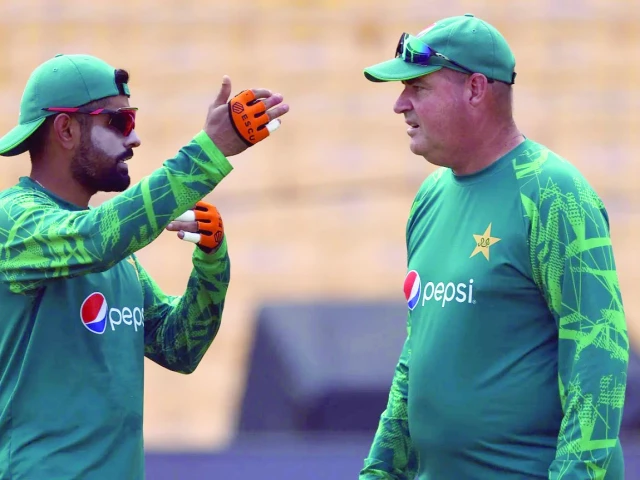Babar Azam Resigns from White-Ball Captaincy
In a major development for Pakistan cricket, Babar Azam has stepped down as the captain of the national team’s white-ball formats. The Pakistan Cricket Board (PCB) chief, Mohsin Naqvi, addressed the situation in a press conference, confirming that Babar made the decision voluntarily and was not pressured by the board.
The 30-year-old batter had been leading Pakistan in white-ball cricket since 2019 but struggled to secure a major international title during his tenure. Following disappointing performances in the Asia Cup and ODI World Cup last year, Babar decided to relinquish his leadership role, stating that he wanted to focus on his personal game.
Naqvi, while speaking at a press conference in Lahore, stated:
“Babar Azam himself told me that he did not want to continue as captain. No one from the PCB asked him to step down. He discussed his decision with the coaches and expressed his desire to prioritize his individual performance.”
The Decision Behind Babar Azam’s Resignation
Babar Azam’s resignation did not come as a complete surprise to cricket analysts and fans. Since taking over as captain in 2019, Pakistan has had its share of highs and lows under his leadership. While the team reached the semi-finals of the 2021 T20 World Cup and the final of the 2022 T20 World Cup, they failed to win any major ICC trophies.
Pakistan’s struggles became more apparent in 2023. The team was knocked out of the Asia Cup in the Super 4 stage after a heartbreaking defeat against Sri Lanka. Their ODI World Cup campaign was equally disappointing, as they failed to reach the semi-finals despite a promising start. Critics began questioning Babar’s captaincy, particularly his tactical decisions and leadership under pressure.
With growing scrutiny and expectations, Babar finally decided to step down, acknowledging that the captaincy was affecting his performance. On October 2, he took to his official X (formerly Twitter) account to make the announcement, saying:
“It has been an honour to lead the Pakistan men’s cricket team. However, I believe stepping down as captain will allow me to focus better on my own game and contribute more effectively to the team’s success.”
His statement was met with mixed reactions from fans and former cricketers. While some appreciated his decision to focus on his batting, others believed he should have continued leading the team, especially with the ICC Champions Trophy 2025 on the horizon.
Who Will Lead Pakistan Next?
Following Babar Azam’s resignation, the PCB moved quickly to announce his successor. Star wicketkeeper-batsman Mohammad Rizwan has been appointed as Pakistan’s new white-ball captain, with Salman Ali Agha named as vice-captain.
The PCB chief confirmed that the decision was made after extensive discussions with the coaching staff and cricket mentors. He stated:
“We consulted the five mentors of the Champions Cup along with the coaches, and the majority agreed that Mohammad Rizwan should be the new captain. Salman Ali Agha will serve as his deputy.”
Rizwan, known for his resilience and calm demeanor, has been a key player for Pakistan in recent years. He was a vital part of Pakistan’s success in T20 cricket, forming a strong opening partnership with Babar Azam. His ability to anchor the innings and his leadership skills on the field made him a strong candidate for the captaincy.
However, questions remain about how Rizwan will handle the responsibility of leading Pakistan in both ODI and T20I formats. Some believe he has the temperament for the job, while others worry that the additional burden might affect his batting performances.
What’s Next for Babar Azam?
With the captaincy pressure off his shoulders, Babar Azam now has the opportunity to focus entirely on his batting. He remains one of the top batters in world cricket, and Pakistan will still rely on him to deliver match-winning performances.
Fans are hoping that this decision will bring out the best in Babar, allowing him to play with more freedom and confidence. His record in international cricket speaks for itself, and without the added burden of leadership, he might rediscover his best form.
Pakistan’s next challenge will be their limited-overs tours of Australia and Zimbabwe, where the team will look to build a strong squad under new leadership. Rizwan’s captaincy will be tested, and it will be interesting to see how Pakistan adapts to this new chapter in its cricketing journey.
The Future of Pakistan Cricket
Babar Azam stepping down marks the end of an era, but it also opens doors for a fresh start. With the Champions Trophy 2025 and the T20 World Cup on the horizon, Pakistan’s new leadership will have to work on building a balanced and competitive team.
While Babar may no longer be leading the team, his presence as a senior player will be crucial. His experience, along with Rizwan’s leadership, could help Pakistan achieve the success they have been striving for in recent years.
Only time will tell whether this transition will be beneficial for Pakistan cricket, but one thing is certain—Babar Azam remains a key pillar of the team, and his contributions will continue to be vital in the years ahead.



